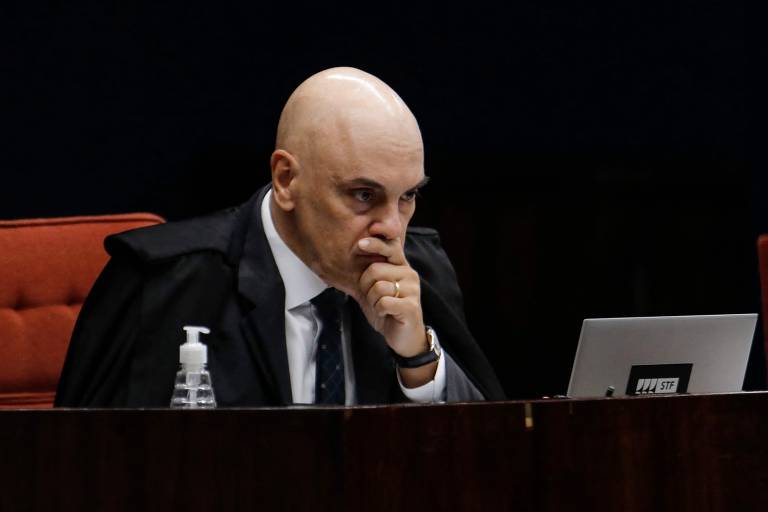Brasília Today: Moraes' vote on Bolsonaro is expected at the Supreme Court in the second week of the trial

The Chief Justice of the First Chamber of the Supreme Federal Court ( STF ), Cristiano Zanin , has scheduled the trial of the central figure in the coup plot to begin on September 2. The Justices of the Chamber are expected to discuss the merits of the charges only in the second week of the trial.
Former President Jair Bolsonaro ( PL ), who is under house arrest, and seven others are defendants accused of crimes against democracy.
Sessions have been scheduled for September 2, 3, 9, 10, and 12. The trial begins with the reading of Minister Alexandre de Moraes ' report—the reading and oral arguments by the PGR (Attorney General's Office) and the defendants' defense are expected to take up the first two days of the trial.

This is because Moraes' report must be extensive and detail all phases of the process, with the PGR's arguments for accusing the defendants and the defense's arguments for acquitting them.
Then, the prosecution and defense attorneys will each have 1 hour for oral arguments -- a phase of the trial that can last about 9 hours.
Moraes will only present his final vote after each party has spoken. He is expected to present his conclusions for the conviction or acquittal of each defendant separately.
The trial dates were set this Friday (15) after Moraes informed Zanin that he is ready to take the coup plot case to trial.
The trial calendar provides for sessions at different times depending on the day:
In addition to Bolsonaro, the defendants are former Navy commander Almir Garnier, former Justice Minister Anderson Torres , former GSI chief Augusto Heleno , Lieutenant Colonel Mauro Cid , former Defense Minister Paulo Sérgio Nogueira and former Chief of Staff Walter Braga Netto .
Federal deputy Alexandre Ramagem (PL-RJ) is also part of the group, but the process against him was partially halted by order of the Chamber.
The eight defendants were charged with the crimes of coup d'état, attempted abolition of the democratic rule of law, armed criminal association, qualified damage to public property and deterioration of listed heritage.
The maximum penalties combined exceed 40 years in prison.
In his case report, Moraes will detail each stage of the criminal proceedings, the Supreme Court's decisions, and the allegations made by the Attorney General's Office and the defendants' defense. Attorney General Paulo Gonet will then have two hours to deliver his oral arguments.
The defense of Lieutenant Colonel Mauro Cid, the whistleblower in the case, will be the next to speak for the same period. Afterward, each of the defendants' defenses will have equal time to argue for the acquittal of the accused. The attorneys will be called in alphabetical order of the accused.
This is because Justice Alexandre de Moraes will only present his vote after each party has spoken. He must present his conclusions for the conviction or acquittal of each defendant separately.
The order of votes is determined by seniority. The order will be as follows: Flávio Dino , Luiz Fux, Cármen Lúcia , and Cristiano Zanin—the last to speak, as he presides over the panel.
Conviction depends on the majority of votes of the ministers of the First Chamber.
Supreme Court case law states that convicted individuals should only begin serving their sentences after the case has been finalized. This means that even if defendants are found guilty, any eventual imprisonment should only occur after the defense's appeals have been reviewed.
The number of appeals to be filed depends on the justices' votes during the trial. If there is a disagreement, the defense can pursue these appeals in more detail. In the event of a unanimous conviction and sentencing, the defendants have less room to maneuver.
The Supreme Court expects the appeals to be heard by the end of October. In this scenario, any convicted individuals should begin serving their sentences this year.
Some of the defendants' defense attorneys believe, however, that Luiz Fux can request to review the case and postpone the trial of the coup plot for up to 90 days. This mechanism is used when the justice wants more time to analyze the case before casting his vote.
uol


%2Fhttps%3A%2F%2Fi.s3.glbimg.com%2Fv1%2FAUTH_59edd422c0c84a879bd37670ae4f538a%2Finternal_photos%2Fbs%2F2022%2FN%2Fa%2FnNKHbxSLqBGdl1lSkujw%2Fhungria-hip-hop-div-ed.jpg&w=3840&q=100)
%2Fhttps%3A%2F%2Fi.s3.glbimg.com%2Fv1%2FAUTH_59edd422c0c84a879bd37670ae4f538a%2Finternal_photos%2Fbs%2F2025%2Fk%2FU%2FkcBHygRw2R7xqBx848Xw%2Fadobestock-463156792-1-.jpeg&w=3840&q=100)
%2Fhttps%3A%2F%2Fi.s3.glbimg.com%2Fv1%2FAUTH_59edd422c0c84a879bd37670ae4f538a%2Finternal_photos%2Fbs%2F2025%2Fa%2FA%2FARgriIQpGe18kVBAyk4A%2Fsciadv.adr5199-f4.jpg&w=3840&q=100)
%2Fhttps%3A%2F%2Fi.s3.glbimg.com%2Fv1%2FAUTH_59edd422c0c84a879bd37670ae4f538a%2Finternal_photos%2Fbs%2F2025%2F9%2Fq%2F4kgzOwQkiZHp96A0pfTQ%2Fregional-projeto-maos-falam-31-07-2025.mp4-snapshot-03.25.374.jpg&w=3840&q=100)